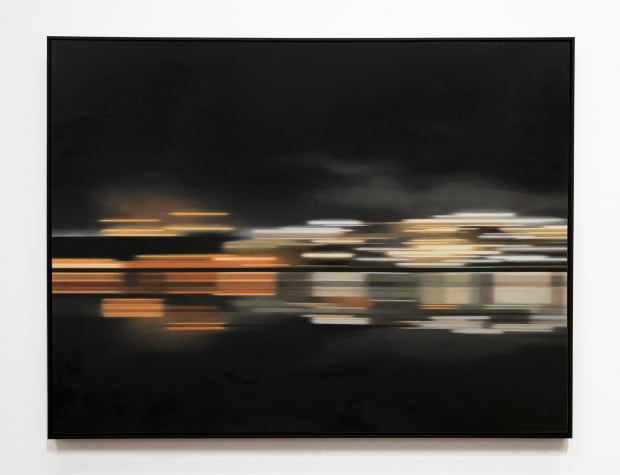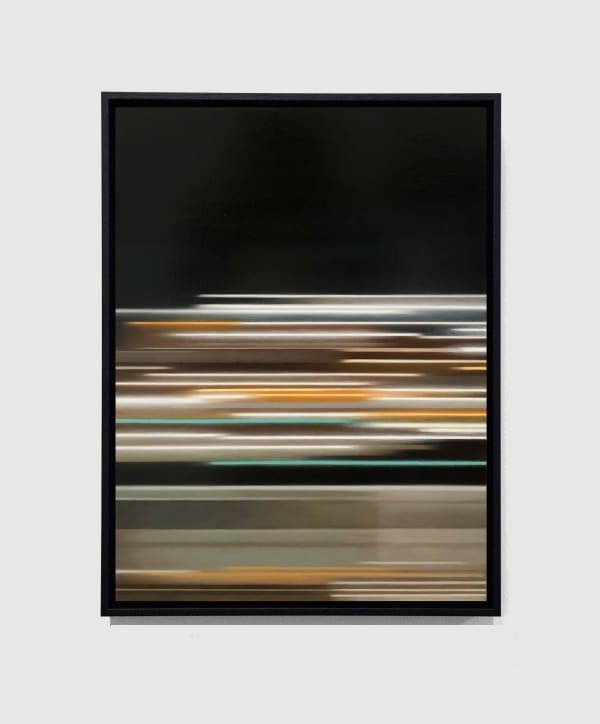-

-

-
'What matters is that this place lives inside of Charadia, and now us too...'
-
 Installation view: Joshua Charadia: Nocturnes IV.
Installation view: Joshua Charadia: Nocturnes IV. -
 Installation view: Joshua Charadia: Nocturnes IV.
Installation view: Joshua Charadia: Nocturnes IV. -
-
-
New Horizons.
By N.Smith GalleryEvery day the sun rises and sets; one of the few things that remains obvious in our everyday life. However, our connection to the movement of celestial bodies has been diminished by modern life, in contrast to the awe and practical interest of earlier civilisations. We seem to let it pass us, quite literally, without any consideration of it at all–at the very least, of its beauty. All forms of beauty, Baudelaire wrote, contain an element of the eternal and an element of the transitory. The sun, being eternal and in constant flux, acts as a grand cyclic reminder to give ourselves whole-heartedly to the experienced world; that there are ends in every new day and beginnings in every new night. The sun rises, only to set for another rise tomorrow, and so on.
Remembering that we are emotional creatures before we are intellectual ones is the feeling I get when viewing Joshua Charadias latest body of work, Nocturnes IV. Here is someone who’s daily sun sets in order for them to croon inaudibly into the night: an ode to the night-space between setting and rising. Each picture emanates with a kind and kinesthetic empathy–these are places you can go alone, places we’ve all been to in some capacity. Was I on a train or night-swimming in a bay? Was it June or December? It doesn't matter. What matters is that this place lives inside of Charadia, and now us too–the inexplicable illuminated by Charadia’s miniaturists precision of touch, how he metabolises the world rendered masterfully for us all to see. Charadia not only notices the rising and setting of the sun–he documents light in its absence, its momentary markers in worlds of movement.
Spinning on the spot surrounded by a common horizon line, Charadia’s work feels like an examination of ritual: both in painting and in life. The horizon, being the line in the earth that represents, essentially, the limit of the world, acts like an energy threshold throughout his works–a straddling of self and world. Painted without immediacy, yet capturing a fleeting moment, Charadia’s images look forward while paying homage to the before–in the company of the past but not subservient to it–together with history but free of its claims. Like staring at a setting sun, there is a charisma in the way Charadia frames and elucidates life’s divinely simple moments: beginnings have endings, endings are beginnings. Charadia’s nocturnes are romantic in the way that they supplant logic with emotion. The Romantics, of the 18th Century, regarded the natural world as the most authentic and charming beauty as it did not obey trivial human rules, but grew and flourished without it. In Charadia’s nocturnes, we see an industrilised landscape take the place of a natural landscape, but causing the same, frisson effect– the omnipotent feeling nature yields. Whether gentle or violent, calm or moody, the transient experience of life’s simple yet meaty bits in Charadias landscape make me walk fast toward his paintings only to slow down once I get there.
On beauty, Baudelaire went on to say, Romanticism is precisely situated neither in choice of subjects nor in exact truth, but in a mode of feeling. If it's true that the artist's only law is to be their feelings, then the evocation Charadia’s nocturnes stir is in his vision of a world built from discrete, personal moments- slow but fast, here but gone, today but yesterday. They remind me that painting is a visual tradition that illuminates the part of an artist’s psyche that is inhabitable by strangers, that there is an entire underworld where the artist can actually be found. But as the sun sets on Charadias final nocturnes series, the ambience of life's cycles feels stronger, and more robust than ever. Like him, they are softly spoken but with an exacting presence, and speak of beginnings and endings as one. They examine things in life that are hard to look at: the world, time, ourselves. And they profile an artist whose attention to moments that could have been, or rather, will be, remind me we’re all just spinning from today into tomorrow with no clue of what's next. Sun rises, the sun sets, and so on.
-
 Portrait by Jasmine Higgins.
Portrait by Jasmine Higgins.


















